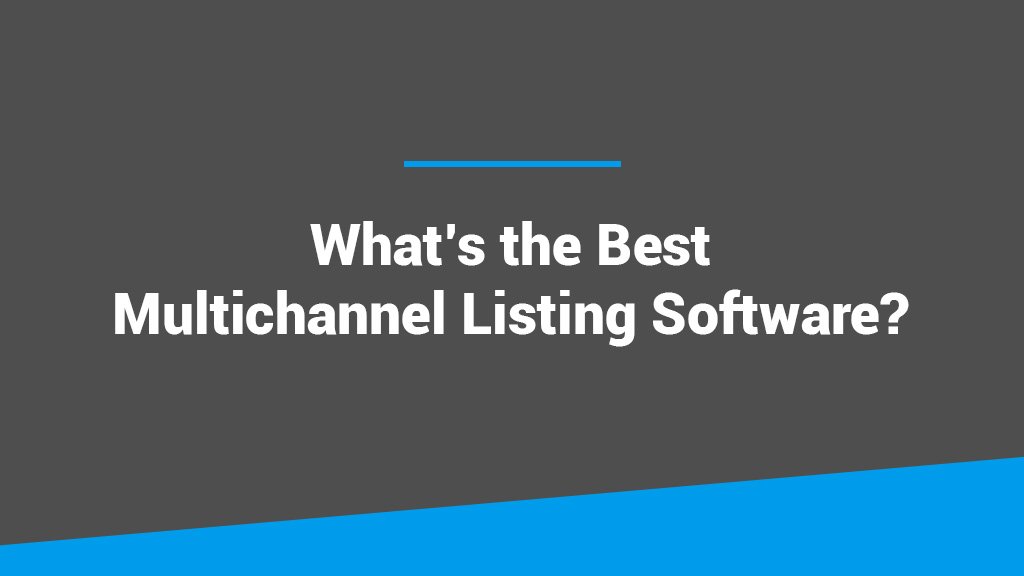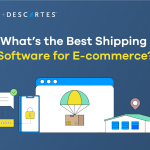
- Multichannel listing software provides a central point to manage and synchronize listings, automate pricing, integrate marketplaces, and monitor inventory levels.
- Descartes Sellercloud helps you manage your multichannel listings and your entire ecommerce business, reducing the need for additional solutions.
Multichannel listing software enables sellers to create a multichannel or omnichannel selling strategy, and there are many benefits associated with this approach.
Quite simply, multichannel selling increases sales as you can reach more customers on more channels. You may also find that some products sell better on different channels, or the algorithms of different marketplaces may favor your products.
Moreover, you may be able to sell products at a lower price on different channels because the costs associated, such as marketplace fees, are lower. There are many reasons to become a multichannel seller.
In this article, we’ll explain what multichannel listing software is, the challenges many sellers face with multichannel listing software, and which is the best to use.
What Is Multichannel Listing Software?

In short, multichannel listing software automates listing creation and management on different channels. It provides a central place for product data—including descriptions, images, videos, price information, etc.—that you can then push to marketplaces.
Using multichannel listing software enables ecommerce sellers to sell on multiple channels to increase their exposure to buyers and increase sales more easily.
Multichannel listing software is nothing new. Ecommerce sellers have been trying to consolidate their listings for a long time.
According to statistics from Verified Markets Reports, 70% of multichannel ecommerce sellers use cloud-based multichannel listing software. They also noted that cloud-based solutions are the fastest growing due to their flexible work environments and their “scalability, cost-effectiveness and ability to integrate with various platforms.” The remaining 30% use on-premises, which is usually preferred by larger companies for security.
What Are the Benefits of Multichannel Listing Software?
Multichannel listing software comes with heaps of benefits for ecommerce sellers. For many ecommerce sellers, a multichannel strategy is impossible without the right software.
Increase Sales and Scale Up and Down When Necessary
The main benefit of multichannel listing software is to save time and money from meticulously adding and updating products and their information for each sales channel.
Customers can be loyal to certain marketplaces. They might not even realize it; it just becomes habitual—they get used to a certain marketplace, and it becomes convenient to keep using the same one. However, by expanding your online presence from Amazon to Walmart, you could come across additional customers who never use Amazon but rely heavily on Walmart for online purchases.
Furthermore, multichannel listing software enables businesses to scale up and down rapidly. If you need to get lots of listings on many channels quickly, multichannel listing software helps.
When order volume is high, like during the holiday season, using multichannel listing software is a major benefit, as it makes bulk listing and pricing updates significantly easier and helps reduce the chance of overselling.
Prevent Overreliance on a Handful of Marketplaces
Selling on multiple channels helps mitigate risk. If you sell on one channel and for whatever reason you can no longer sell on that channel, it can destroy your business. Multichannel selling also reduces the impact of increased marketplace fees on profitability and sudden crashes, which can grind a business to a halt if it only sells on one channel. Meanwhile, sellers using multichannel listing software can move their business to other channels.
Expand to New Channels Faster
Multichannel listing software makes it significantly faster to upload listing information and feed it straight into a new marketplace. It enables you to outmaneuver your competitors by selling in marketplaces where they don’t currently have a presence.
Furthermore, if you are the first to sell a product in a marketplace, you can dominate the product category early on without any competition.
If you don’t use this type of software, expanding onto new channels consumes a lot of time and labor, and you will not move as fast as your competition.
Reduce The Time Required to Update Listings
Related to the point above, not only is it easier to add listings to new marketplaces, but it is much easier to update your active listings with multichannel listing software. Imagine manually updating hundreds or thousands of products across three or four platforms— the amount of time it would take and the possible mistakes it could lead to.
Plus, if, for whatever reason, you need to take many listings down all at once, it is also much easier with multichannel listing software.
The time saved can then be used to work on other tasks. You also don’t need to rely on as many employees to handle listing management.
Reduce Human Error
Because information is automatically pulled to different marketplaces from a central point, human error is reduced because there are fewer instances where a person updates information.
Reducing the error rate also makes your data more reliable, meaning your reports are more accurate, enabling better decision making.
Another benefit of multichannel listing software is that you only need one sign-on for all channels. You don’t need to log into every channel every time, remember several passwords, and navigate multiple login processes.
Boost Brand Awareness and Maintain Consistency
Because you sell on multiple channels, your brand awareness will grow, and with multichannel listing software, you can ensure your approach is consistent.
Collect Richer Consumer Data
By selling on different marketplaces, you reach different consumers, diversifying the data you collect and giving you a more comprehensive consumer profile. You may even uncover hidden secondary audiences for some of your products and new ways to market your products or develop new bundle/kitting ideas.
Multichannel listing software gives you a unified point to access all that information.
Compliance
Marketplaces have different rules that sellers must abide by. Not abiding by these rules can result in disciplinary action and even account bans, which can be devastating if this is a large sales channel for your business.
Multichannel selling makes this much more complicated because monitoring your compliance over several channels is harder. Multichannel listing software makes this easier.
It’s not just marketplaces that ecommerce sellers need to comply with—they also need to consider any agreements they have with their vendors. For example, if you sell products with a Minimum Advertised Price (MAP) policy, sellers must ensure that they are not sold below that specific price.
Multichannel listing software helps businesses set rules to automate compliance and monitor it from one place.
What Are the Common Challenges of Multichannel Listing Software?
Ecommerce sellers have encountered plenty of challenges with multichannel listing software. Awareness of these common shortcomings can be advantageous when choosing the right solution for your business.
Bulk Updates
To make bulk changes to multiple listings simultaneously on different channels, you often need to export the information to a spreadsheet, update it and then import it back in to the platform.
Not only does this take a lot of time but marketplaces use different spreadsheet templates with attributes organized and named differently. This is called ‘data mapping.’ Unfortunately, many multichannel listing solutions do not offer this functionality for large-scale updates.
Price Management
A key factor in staying ahead of the competition is price management. As a multichannel seller, you must manage the price of your products across many channels. It can be a race to the bottom with some items as sellers compete for the best price and the Buy Box.
Manually tracking prices is nearly impossible for some large companies with many SKUs, as prices are constantly on the rise or fall.
SKU Limits
Some multichannel listing software has limits on the number of SKUs a business can include in its catalog. This is a major barrier to growth and makes it difficult to scale up and down as needed.
Alternatively, some software platforms may charge based on the number of SKUs or have a tier plan, and sellers must sign up to a higher tier to add more SKUs. This is not convenient and can be an unexpected operational cost.
However, there are options like Descartes Sellercloud that do not impose SKU limits.
Limited Channels
Some listing software providers boast that they are connected to all the ‘top marketplaces.’ However, the top marketplaces are just the tip of the iceberg when it comes to multichannel selling.
Sellers using such software will miss out on niche marketplaces, shopping cart integrations, and other channels that could be relevant to their products. Additionally, some solutions might connect with many channels but have integration issues, or there may be limitations to what you can do on each channel.
Lack of Inventory and Order Management Features
When you list products across multiple channels, your operations will become more complex as volume increases. This means the workload in the warehouse will also increase, which can result in more mistakes and lengthier shipping times.
Integration Issues
Finally, some marketplace listing software can struggle with integration issues and technical challenges that can be hard to overcome. Integration issues can extend the time needed to implement software, leading to operational disruptions that can potentially harm your business.
Top 5 Best Multichannel Listing Software
Here are the top five multichannel listing software solutions you should consider.
1. Descartes Sellercloud
Descartes Sellercloud excels with its comprehensive inventory management and real-time tracking across multiple warehouses, preventing stockouts and overselling. Annually, it processes 150 million orders for customers.
The solution supports product bundles and offers predictive purchasing to optimize stock levels, and a wide range of automations to make work easier and more efficient. You will also be able to manage returns and refunds with ease and track serial numbers.
Lastly, it integrates with over 350 integrations, including 150 marketplaces. Other advantages include shipping, listing, inventory, and warehouse management features, enabling you to control your entire ecommerce operation from one solution, and can be customized to provide any additional features you may need.
2. Rithum (formerly ChannelAdvisor)
Rithum is a multichannel listing tool with a good deal of marketplace integrations and a strong focus on getting your products listed on as many channels as possible.
Though Rithum is good for listing on multiple platforms and its long-standing presence in the market provides a wealth of experience, it is a costly solution, and many businesses quickly outgrow it as they also need order and inventory management features.
Furthermore, Rithum often charges customers a revenue percentage, and while they can be helpful in getting products listed on international marketplaces, businesses often need to find a more robust tool in a more affordable price range as their business scales.
See how Descartes Sellercloud compares.
3. Zentail
Zentail distinguishes itself from other ecommerce management tools through its intelligent automation and ease of use. Key differentiators include its ‘SMART Types’ listing tool, which automates product categorization and speeds up listing on multiple platforms, and its dynamic repricing tool.
Zentail also ensures inventory synchronization and offers analytics and customer support.
See how Descartes Sellercloud compares.
4. Goflow
Goflow also has a wide range of integration capabilities, connecting over 200 marketplaces and channels. It features real-time inventory synchronization and centralized order management, allowing users to automate tasks efficiently.
Goflow also has an intuitive design that is easy to use, minimizing the need for extensive training.
See how Descartes Sellercloud compares.
5. Solid Commerce
Solid Commerce centralizes ecommerce logistics, allowing users to manage orders, inventory, and shipping across multiple marketplaces from a single interface.
It offers batch printing of shipping labels and seamless integration with major carriers. The platform supports over 30 marketplaces, facilitating efficient multichannel listing management and inventory synchronization.
See how Descartes Sellercloud compares.
What to Look for in Multichannel Listing Software?

While many multichannel listing platforms aim for the same thing—managing your listings across as many marketplaces as possible—the functionality available on the market varies dramatically.
Before considering any software, you need to understand your business’s needs. The solution should also fit your budget, offer needed features, and be scalable. You also need to consider the implementation process and any customization work that might be required.
Here are the top five requirements you should seek when comparing different multichannel listing software platforms.
1. A Broad Selection of Channel Integrations
At the very least, you should expect access to the most renowned marketplaces. However, to maximize your reach, good multichannel listing software should also offer emerging channels such as social media and niche marketplaces and regularly add new channels.
The ideal solution should allow sellers to request custom integrations with any channel they need to include. Descartes Sellercloud does just that.
2. Synchronize Information Between Marketplace Properties
Your multichannel listing software should also operate as a Product Information Management (PIM) tool—a central point for creating, updating, and monitoring listings across channels. A good PIM can help map marketplace attributes, so the right information is shared in the right way for each channel and helps ensure you stay compliant with marketplace rules.
Descartes Sellercloud offers these capabilities.
3. Advanced Listing Features
Exceptional multichannel listing software should give you a high degree of control and flexibility over how your products are listed.
There are plenty of features to look out for. Here are some of the most valuable:
- Variation listings enable each item to have its own SKU (e.g., T-shirts available in different colors and sizes).
- Mirror listings (also known as ‘shadow listings’) allow you to create a copy of your listing.
- Create bundles/kits with specific availability rules. For example, bundles that are only available if all components are in stock or if a certain component is available.
- Supports multicompanies, making it easier to market individual brands and products, isolate domestic and international sales, and separate B2C and B2B.
- Select the preferred shipping method for each product on each marketplace.
- Download SKUs from existing listings. If a competitor sells a product that you also want to sell, you can download that listing and upload it to your marketplaces.
All are features available to Descartes Sellercloud customers.
4. Reporting and Analytics
You must be able to gauge your performance across channels, so you are able to see which products are doing well and where improvements can be made.
Reporting and analytics can drive your decision-making process. Maybe there are different things you can try on different channels. It may be the case that you decide to drop a channel, that you need to expand to more, or that you need to find a way to make some channels more affordable to sell on or increase prices.
5. Inventory Control
Inventory control is not always offered by multichannel listing software, but it is highly valuable to have. If your marketplace listing software does not have this, it can lead to overselling, which is where you sell products that are no longer in stock.
Multichannel listing software should communicate with your inventory management system and make product listings unavailable on all channels when they are out of stock. Ideally, you should look for a solution that combines the listing with other crucial operational needs, such as order, inventory, and warehouse management.
Some solutions handle listing exceptionally well but have limited ecommerce features, meaning you must invest in additional solutions that may complicate your operations, increase costs, or lack integration options.
Descartes Sellercloud is a complete solution that covers all these aspects of ecommerce selling.
6. Competitive Pricing
Whatever solution you’re considering, price does not always indicate quality. Some solutions cost more but deliver less and some lower cost options can be very limited in terms of features. Most follow a subscription plan, some prefer annually, and some require a revenue share. Some are also not transparent about pricing, and you need to reach out for a more accurate quote.
You must know what features are most important for your business, which ones are optional, and which you do not need. Only then can you decide if the price is right. For smaller ecommerce businesses, the cost of multichannel listing software can be a major barrier. However, without this software, it can be difficult to grow.
7. Exceptional Customer Support
Problems can cost businesses money, and support must be available to resolve the issue promptly. Ideally, businesses should be able to reach support through various methods—phone, email, and chat—and should be available during your primary business hours.
Good support also includes relevant training when integrating the software and technical documentation, so people know how to use it.
Why Is Descartes Sellercloud the Best Multichannel Listing Software?
Descartes Sellercloud has worked with enough ecommerce businesses to know each operates in its own way and that there is a ‘no-one-size-fits-all’ approach for your multichannel strategy. That’s why Descartes Sellercloud is built to be as flexible as possible for your multichannel needs, providing advanced catalog features multichannel sellers need to thrive.
For example, with Descartes Sellercloud, you can easily copy your competitors’ Amazon listings and create ASINs from within the interface—powerful features you will not find elsewhere.
Descartes Sellercloud doesn’t just handle multichannel listings—it also handles inventory and order management, shipping, accounting, purchasing, and much more from a unified interface. It is a truly complete ecommerce solution.
Businesses can also manage their wholesale operations, brick-and-mortar sales, and DTC sites through Descartes Sellercloud and you can access 350+ out-of-the-box integrations and request custom integrations from our dedicated team.
CPG.IO are a 3PL service working with 200 brands including Kraft Heinz, Campbell’s, Nestlé, SC Johnson, Rubbermaid, and Newell. Despite its immense success, CPG.IO struggled with multichannel listing management until it deployed Descartes Sellercloud. Read the full case study here to find out how Descartes Sellercloud solved their multichannel listing challenges.
Watch the video below to see how Descartes Sellercloud has already made multichannel listing easier for many businesses.
Do you want to find out more about how Descartes Sellercloud can help you manage your multichannel business better? Book a demo today.
Key Points
Remember these key points about multichannel listing software.
- Enables a multichannel ecommerce strategy without having to manually create and update listings across channels.
- There are many benefits to using multichannel listing software, but understanding the potential challenges makes them easier to overcome.
- The most important features to consider are channel selection, PIM, advanced features, reporting, inventory control, competitive pricing, and good support.
- The best multichannel listing software includes Descartes Sellercloud, Rithum, Zentail, Goflow, and Solid Commerce.
- Descartes Sellercloud is a complete ecommerce solution that provides advanced listing features and order, inventory, and warehouse management from one interface.




